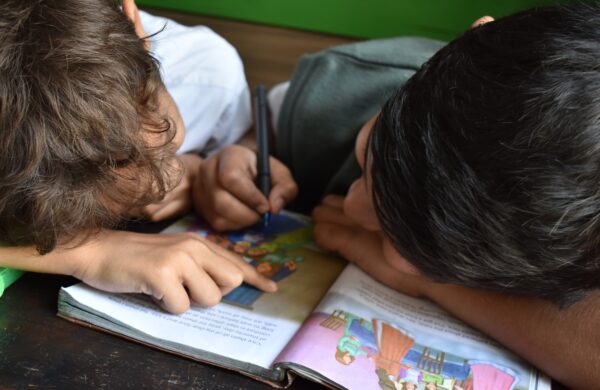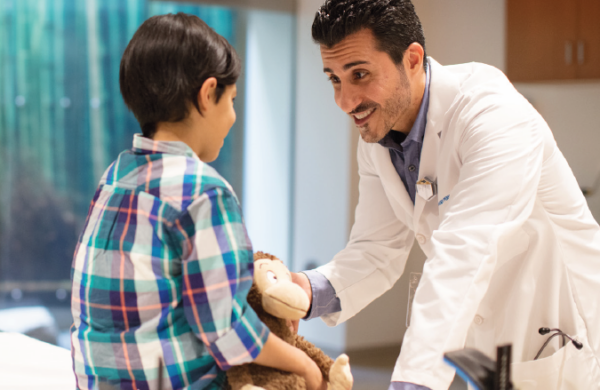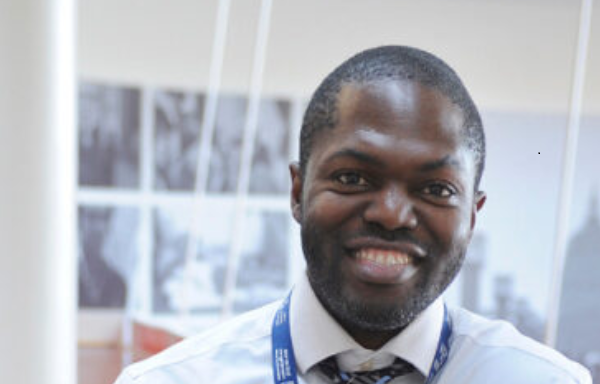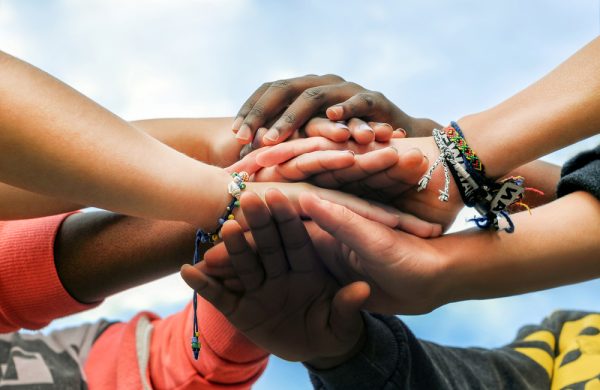Understanding trauma and resilience in children and families begins with supporting the care team and staff. In this episode, primary care pediatrician Niyi Omotoso and licensed clinical social worker Gillian Fynn from LifeLong Medical Care within the Resilient Beginnings Network unveil the profound impact of trauma-informed care in pediatric medicine. Discover LifeLong Medical Care's journey through this transformative cultural shift and its influence on staff, providers, and leadership. Learn about their efforts to establish foundational trauma-informed approaches, laying the groundwork for enhancing care delivery by centering collective resilience, staff/provider wellness, and fostering meaningful engagement with families. Below is a transcript of the episode, edited for readability. Learn more about the people, places, and ideas in this episode:
- "What are adverse childhood experiences (ACEs)?"
- Pediatric ACEs and Related Life Events Screener (PEARLS)
- "What are social determinants of health (SDOH)?"
- Visit LifeLong Medical Care - serving the Bay Area for more than 45 years, LifeLong Medical Care provides high-quality health, dental, and social services to underserved people of all ages; creates models of care for the elderly, people with disabilities and families; and advocates for continuous improvements in the health of our communities.
- How a Health Center That Screens for Childhood Trauma Worked to Heal Itself First - related article featuring LifeLong Medical Care (May 2023)
- More on Resilient Beginnings Network (RBN), a Center for Care Innovations learning program dedicated to advancing pediatric care delivery models that are trauma- and resilience-informed so that 100,000 young children and their caregivers have the support they need to be well and thrive.
- Renée Boynton-Jarrett, MD, ScD - Founding Director of Vital Village
- Featured in Breaking the Cycles of Trauma through Recognition and Healing, - CCI webinar presented by the Resilient Beginnings Network
- CenteringParenting is a family centered way to get care for moms, babies, and families. CenteringParenting is a breakthrough strategy for advancing early relational health and transforming the child health delivery system to be ever more family-centric, equitable and resiliency focused.
- How childhood trauma affects health across a lifetime - Dr. Nadine Burke Harris, TEDMED Talk
 Podcast production services by Wayfare Recording Company.
Podcast production services by Wayfare Recording Company.
Episode Teaser // Omoniyi "Niyi" Omotoso (guest): So when people ask me about the work, I kind of explain to them there's actually everything we're doing as a healthcare organization, it touches every aspect of what we do, even if you're not directly facing patients. It's made me rethink a lot of our processes and practices and protocols, the way we communicate. It's made us revamp. How do we interact with our staff members? How do we hire staff? How do we train staff? How do we communicate to our patients? How do we do patient education and provide a straight guidance? Health Pilots podcast intro:
Welcome to the Health Pilots podcast presented by the Center for Care Innovations. This podcast is about strengthening the health and well-being of historically underinvested communities. Every episode offers new ideas and practical advice that you can apply today!Episode 54 intro // Resilient Beginnings Network (RBN):
What does it mean to be trauma- and resilience-informed and how does it impact pediatric care delivery? To answer this and to share with us deeper insights into the work, Health Pilots is featuring dedicated care teams from the Resilient Beginnings Network at the Center for Care Innovations. Facilitating this conversation with the team we have today is Dr. Dayna Long, primary care pediatrician and clinical director for the Resilient Beginnings Network, or “RBN” for short. Hear the team’s journey through this program - the valuable lessons they’ve learned individually and as a care team - and the unique, transformative impact of the Resilient Beginnings model on patient care. In this episode, you’ll hear our guests speak about adverse childhood experiences, known as ACEs, as well as the screening tool to address ACEs called, Pediatric ACEs and Related Life Events Screener, otherwise known as PEARLS. For more information about these concepts and tools, please visit our episode’s show notes. With that said, I’ll pass it on to Dr. Dayna Long for our episode today!Dayna Long (host, RBN): Hi, I'm Dr. Dayna Long, a pediatrician at UCSF Benioff Children's Hospital in Oakland, and the Medical Director for the Center for Care Innovations' Resilient Beginnings Network. I'm thrilled to be here today for this podcast that highlights the incredible work that the LifeLong Medical Center has been doing as part of the Resilient Beginnings Network. I'm here today with Gllian Fynn and Dr. Omotoso from LifeLong Medical Center. Omoniyi "Niyi" Omotoso (guest, LifeLong Medical Care): Hi, I'm Omoniyi Omotoso, a primary care pediatrician and the Associate Medical Director of Pediatrics at LifeLong Medical Care. I practice my primary care pediatrics at the LifeLong William Jenkins Health Center in Richmond. We've been on this journey now five years trying to make organization more trauma and resiliency informed. Gillian Fynn (guest, LifeLong Medical Care): Hi, I'm Gillian Fynn. I'm a licensed clinical social worker. I'm actually retired from LifeLong now, but I worked there for 15 years, mostly as a mental health clinician in one of the clinics, and so worked with Niyi for probably about four years, Niyi, I think, around the effort to make lifelong a trauma-informed organization. Dayna Long: You both started to touch on the history of LifeLong Medical Center. Can you tell us more about your clinic, the populations that you serve and the work that you're doing there? Niyi Omotoso: Yes, thank you. Yeah. LifeLong Medical Care has about 15 locations that provide integrated primary care both throughout Alameda and Contra Costa County. We see the all age spectrum from newborns through geriatrics. We also do prenatal care and integrated behavioral health. We're a Federal Qualified Health Center, and so majority of our patients are on medical or uninsured. We work with lots of underserved communities, and so we have a wide spectrum based on the clinical locations. We serve quite diverse communities. Dayna Long: Before you started this work and joined the Resilience Beginning Network, what did trauma and resilience-informed care mean to you? Gillian Fynn: So Dayna, because I'm a psychotherapist, this meant treatment and education for families to me. I have many years of working with trauma, especially with mothers and young children. I was working with people who were already traumatized to try and set things right. I was really interested in the Resilient Beginnings intent to build resilience through primary care. I thought that this was an amazing public health opportunity that if we could do this, we could prevent some later chronic illnesses since adverse childhood experiences (ACEs) has educated us so well on the connections between early trauma and later illness. I could see that this was a great opportunity for perhaps prevention, but also early detection and developing resilience. Dayna Long: So it sounds like, Gillian, what you're saying is that as a mental health provider, you've always dealt with trauma. Prior to Resilient Beginnings, your framework was that you were thinking about trauma-informed care and resilience-informed care as a treatment. But now when you put on this public health lens, your thinking is much more about primary and secondary prevention, long before the treatment needs to begin. Is that what I'm hearing from you? Gillian Fynn: Yeah, that's right. That's what I saw in what the Resilient Beginnings was aiming for, and I was very excited about that. Dayna Long: Exactly. Niyi, you are a primary care physician who's been practicing for a while now. What did the shift mean to you as a provider? Niyi Omotoso: It was huge because I was not familiar with the language or trauma and resiliency-informed before we applied for the first grant. As a primary care provider, I was used to working with families that have been traumatized and trying to figure out how to deal with the traumas they've experienced. For me, one of the reasons I got into pediatrics was to focus on primary and secondary prevention. When this grant opportunity came along, I was excited because this talks about dealing with prevention, a focus on prevention rather than just treatment, which is a lot of what we do nowadays. I was very excited to figure out how do we do this in a way that is impactful for the patient families we work with? Dayna Long: So how do you do it now? What has changed? Niyi Omotoso: I would say everything, to be honest. [Laughs] Yeah. Yeah. It's funny. When we started this, once I learned the language and realized what it entails, I realized quickly that it actually impacts the way we practice medicine. Literally everything. So when people ask me about the work, I kind of explain to them there's actually everything we're doing as a healthcare organization, it touches every aspect of what we do, even if you're not directly facing patients. It's made me rethink a lot of our processes and practices and protocols, the way we communicate. It's made us revamp: "How do we interact with our staff members? How do we hire staff? How do we train staff? How do we communicate to our patients? How do we do patient education and provide a straight guidance?" So I think it's changed, and I realize now that really it is everything we do. Gillian Fynn: Yes, I agree with Niyi. When we first joined the Resilient Beginnings, I had imagined that our work would be pretty quickly about directly strengthening our work with young families without thinking through what that would entail. We quickly found that we needed a much broader view than that. For example, we found that many of our staff needed a great deal of support before they were comfortable talking with families about trauma if they were patient-facing. It meant that we really had to look at the kind of systemic change that he's talking about, that everybody had to be involved in this and that we had to work with staff before we really could ask them to work with families with children in a different way. It's a journey. We learned a lot as we went. The goal obviously is ultimately still how we serve young families and Resilient Beginnings gave us several projects to do. I was looking through the last project that I was involved in, and I really liked what Niyi had said about what's our desired future and how we imagined a family coming to a lifelong pediatric clinic would be served from the moment they walked in the door through to how they were seated and how screening tools were explained. Even to a provider and an MA, for example, having even just five minutes after a visit to just check in with each other about how the visit went. Those may not seem huge, but they are, when you're working in a large organization and you have many levels of staff to work with, and tight schedules always time, how much time do we have to do this work? I've been really delighted with how it's progressed. It took time. It took time. And that was another thing we learned. I think Niyi, right, you had to be really patient and hang in there to be able to do these things. Niyi Omotoso: A lot of patience. Yeah, I think going into it, I still had a narrow mindset of dealing with ACEs and how do we set up to screen. And like Gillian said, when we started looking into dealing this with staff, we realized that we actually needed to pivot and focus on the office environment, which was one of our aims in the first grant, which was, "What can we do to better support our staff and the environment they work in before we start talking about changing the way we attend to patients or interact with our patients?" And that was very eye-opening actually, to learn that lesson. Gillian Fynn: And how difficult it was to do, if you remember. Yeah, we had chosen our first spot that we thought needed trauma-informed care the most, and found that we really had to back away, that our expectations were too high, that there was a lot of groundwork that needed to happen at that site before we could ask people to start doing things differently. Dayna Long: So walk me through that. I've heard both of you comment that: "staff needed support, we needed to change the environment." What is it that you changed and how did you change it? Niyi Omotoso: Yeah, so the first thing we did was one of the sites we thought would need this the most given the kind of level of traumatized patients they saw on a regular basis. We went into that site and talked to the leadership at that clinic and talked to them about the work we're trying to do and how it was impactful for the patient families. We felt that was a huge need at that clinic. We were able to get buy-in to start having monthly meetings with the staff. And coincidentally at the time, we also had a county child psychiatrist that was also in the clinic consulting, and she agreed to collaborate with us to lead these monthly meetings with staff, where we started off just talking about stress and trauma and the impacts it has on the body and how it can appear in different people. When we see someone in clinic that could be what's going on as opposed to people just misbehaving, and how do we approach and deal with that and keep that in mind as we approach patient care. Then talking about how that can impact a social-emotional state, but also especially kids. Through a series of lectures, we would provide lunch and do these talks and discussions with the group. After that, we tried to introduce ACEs and we watched the TED talk that Dr. Nadine Burke Harris had made. Another session we went through the PEARLS screen itself, explained how it works, went through the questions, had people anonymously look through it in the room and give their feedback. That's when we realized that a lot of people were very uncomfortable with the kind of questions we're asking, and partly because a lot of them had also experienced those traumas themselves, that had not been addressed. It was kind of eye-opening to us that we had gone and thinking everyone is motivated to do this work, but didn't realize that people had to be emotionally ready to do this kind of work and how can we support them to do it? Luckily, me and one of my colleagues went to a site visit through the Resilient Beginnings to Montefiore in New York, and saw how they changed the office environment and culture to do this work. That's when the light went off that, "oh, we actually need to change how the culture is and the environment of the office and support staff before we start moving on to trying to address this with patients." We completely had to start from scratch on our approach to make an organization more trauma-informed. Gillian Fynn: We also recognized that maybe one of the most important things we needed to do was orientation. We worked for a long time to get some acceptance that perhaps all new staff coming to LifeLong would need an intensive on trauma-informed care, like a one-hour session, is not enough. You really need something more than that for an opportunity for people to process it - to set the expectation that this is what Lifelong wants to see happen, that LifeLong wants to be a trauma-informed organization. And so how do you spread that through...how many clinics, Niyi? Niyi Omotoso: We have eight pediatric clinics. Gillian Fynn: Eight peds clinics. Niyi Omotoso: Across two counties. Gillian Fynn: And for the rest of them, there are also other primary care clinics that don't serve peds, about 15, I think. Niyi Omotoso: Altogether, yeah. Gillian Fynn: How can you spread this message across that many clinics? So doing a new staff orientation was something that we thought was an important step, and I'm happy to say - I am not doing it because I have left the organization - but the momentum kept going forward, and now that in fact is happening, and I think that that was a really good move, too. Dayna Long: It sounds like now this work has become a priority with leadership as well. That sounds like it was a transition, and so making it a priority with leadership is something that we hope that clinics will do. Can you talk about how you helped that transition to happen? Gillian Fynn: We kept plugging away, [laughs] raising it in every form that we could. I think a little bit of progress happened when we had to do the presentation on selling your program. Somebody from the c-suite did come to that, and that had always been our hope that the c-suite would pick it up. From my point of view, it also helped that behavioral health finally had somebody in the c-suite. The behavioral health team was also working on this, and behavioral health is integrated in the clinics, but still they do their own work. They had been implementing, for example, they had a state grant for screening for trauma during the perinatal period so that the leader of the behavioral health people had a great understanding of this. Niyi, what do you think? Do you think people finally started talking to each other? Was there a pivotal moment? What do you think? Niyi Omotoso: I think it's been a slow grind over the years, I would say. Yeah, because what we tried to do was, like Gillian said, reach out in all kinds of forums. we had monthly medical director meetings. It was a topic we brought up as a way to deal with issues we're having in our clinics when it came to staffing, and staff morale and turnover. We brought up with the senior leadership team, as Gillian said. Shortly after the initial work started with the Resilient Beginnings, we had a strategic planning for organization for the next five, 10 years. We honed in on those pieces of it that focused and aligned well with the trauma-informed care work we're trying to do, especially around staff engagement and wellness. We talked to our leadership team about how this could be a good way to achieve those goals. And when we finished the first grant, we had the presentation we did to our senior leadership team about the work we're doing, how it relates to our strategic plan, and the things we could do as organization to help move that forward, and opportunities for it, and gave recommendations and lists. And so over the next couple of years, we've been meeting regularly with our leadership team to discuss ways in which our work aligns with what we're doing. For example, a couple of years ago, they restarted a diversity, equity, inclusion, anti-racism committee and started doing some work. We also got involved with that as a way of how this is all trauma and resiliency-informed. We've basically tried to put ourselves in the room with all these discussions, seeing that it really all relates to the work we're doing in some way. Gillian Fynn: Yeah, I think when Maggie Edmonds joined the team, that made a difference too, because what is Maggie's role in the organization? Is she Deputy CMO? Niyi Omotoso: Dr. Edmonds? Yeah. Gillian Fynn: That's right. Dr. Edmonds. Yes. I think that that also gave us a little bit more of a voice, right? A passageway, one more voice added that could speak to this, and knew what we were doing, and also could give us feedback about what the possibilities were and the ways to approach things sometimes. I think that that helped as well. And then also once you managed to get a project manager who could liaise and also make goals actionable, I think that that made a big difference. Dayna Long: I'm wondering, I think that this is really important to think about how senior leadership has evolved. I do want us to think about community and patients though as well. How do you think this work has actually trickled down, and how is it influencing the way that patients are experiencing LifeLong? Niyi Omotoso: Yeah, I think it's a little difficult to say because we haven't had a formal process of getting feedback from patients. I think from my personal experience as a provider, part of the changes we made as a result was trying to be more engaged with our community and our patients. For example, when the pandemic started a few years ago and there were lots of increased social determinants of health needs in our community that we serve, it prompted us to start screening for that as part of a pilot, and trying to figure out how to help families address those needs and link them to resources. And so in that process, we learned to practice engaging families and asking what kind of resources or helps do they need and in what ways would they like to receive it? And so we've started actively using that to influence any changes we make in the way we practice in clinic, to make sure we're getting feedback from our patients as we do so that we can make changes along the way that best address what their needs are in the way they want it. So I haven't gotten direct response from it, but it's definitely changed how we view programs we run, from being just intentionally, to more, "how is this engaging our patients in the way they want to be engaged?" Gillian Fynn: And one of the things that we identified was, and I'm not sure that post-pandemic, that work has happened yet, but we agreed that we needed a patient voice collaborative that reflected younger families, that LifeLong has always had those collaboratives, but that they probably needed to be separate collaboratives that gave us a patient voice to younger families. There are challenges with that, of course, but I'm sure that that would still be something that would develop. Dayna Long: I love hearing about the patient voice collaborative, really important to center family leads and patient experience so that we can make decisions. Can you tell me a little bit more about that collaborative? Gillian Fynn: Well, the collaborative, when I was there anyway, and the collaboratives that existed were mostly comprised mature adults. The idea was that they had an opportunity to come together and give LifeLong feedback about how they felt about their care, any ways that they thought that the organization could serve them better. That was a group of patients that would come together and meet with the staff person and talk about their experience. Then of course, in addition, LifeLong always regularly did patient care surveys with patients, but the feeling was that young families have different needs from mature adults. And so that would be something that would be good to develop, but what I will say is that there are many things that I know that the team still wants to achieve. COVID, of course, made everything so much more complicated, and one of the things that I'm aware of is that so much of the care is being done from people's homes now that the opportunities for collaboration and integration are probably a little less than they were. So I'm sad to hear that we are not coming into probably another serious COVID season [laughs], and I hope that it doesn't undermine all the great efforts that the team is making now. Dayna Long: As you both know, Resilient Beginnings Network is a collaborative of 15 different clinic sites or health systems. What were some of the best practices that you picked up from other learners that have influenced how trauma-informed and resilience-informed care has rolled out in your clinic? Niyi Omotoso: Yeah, I'll still go back to the Montefiore experience because that really changed or transformed my whole approach and mindset to this work because I could see how they intentionally made this a cultural shift, and got everyone involved in it to understand and educated on the culture, and what it meant and embody it in their work. I think the highlight for me was at the site visit when the chief security officer presented to us and talked about how it has helped him, and give examples of related to staff, where he has staff that are hired, how he notices when a patient's walking that, "okay, this person usually comes in, but today seems like something is going on..." And how they've communicated that to the staff and the clinic, seeing the patient, and also how even his own staff, when they have things going on in their lives is be able to support them and tell them when to take a break or maybe you shouldn't come in today. And it blew my mind that this is really what we're talking about, that everyone is understanding what's going on, but also embodies what we're trying to do. Yeah, I was really blown away, to say the least. Gillian Fynn: And what I remember is, I can't remember which organization it was, but one of them where the CMO and CEO had been really enthusiastic about the whole approach, and they were able to describe exactly what they had done within their organization because of that support. That for me was just a reminder, keep going. We have to get the c-suite involved in this, our leaders, it'll make a huge difference to the organization, if our leaders at the top get involved, because then you have much more chance of creating new norms and policies, which are hard to do from the bottom up. So I remember that, and I kept reminding myself of that when it got hard to try and get leadership buy-in. The other thing I remember was, when we first started thinking, well, how on earth would we do the screenings that it was helpful to hear, I think it was Ravenswood, and one of the other clinics who just explained in detail who had the screening tool, how they had trained their staff to offer it, who looked at it when, what was the follow-up to, what if there was a score on the adverse childhood experiences screening tool? So that was reassuring to hear a clinic had actually managed to do that and how they were carrying it up because it felt a little impossible at the stage that we were at. I will say that it was really helpful to be part of that collaborative just for the support, even though we often, honestly, we often felt that our gains were meager compared to some of the organizations at times, but that didn't matter. It was really helpful to just hear what everybody was doing and know that we were all doing the same work. It's really important for any new venture to have support like that. Dayna Long: I'm hoping that you can share with us about an experience, or a situation, that illustrates the amazing work that you're doing. Niyi Omotoso: One example that sticks to my mind is, one afternoon, we're in clinic, and I could hear a kid and the mom screaming as they were being roomed. And I wasn't sure what was going on, because from my schedule, I don't remember any particular family coming in that afternoon. And so I was actually in another exam room seeing a patient, that it was so disturbing I actually had to pause and excuse myself, to step out, to figure out what was going on. And so I stepped into the triage area and saw this kid that was crying and screaming, and the mom was also shouting, and I walked in to talk to her, because I knew the mom, to figure out what was going on. And mom was shouting into a speakerphone to someone because her kid didn't want to get his blood checked with a finger prick. And she was shouting to someone on the phone that she can't just handle this. And I went to talk to her, to ask what's going on, or what happened - and mom at that point, was like, "We can't do this, let's go." And then got her son and left the clinic. And so at that point, I kind of had to go back to finish up with my other patient that was there. And then after that, I went to talk to my medical assistant, and we kind of checked in together like, "What happened?" Because that never happened to that family, they were always very polite and never-- this was very unusual. And so we kind of talked, and I was wondering what happened. And so we called the family and talked to mom the next day, that, "Yesterday didn't go well, hope everything is okay," and mom agreed to bring the kid back a week later for a checkup. And so at the next visit, the kid came with dad in for the visit, mom waited outside in the waiting room - I didn't know at the time. And the kid came in, we talked to the kid, what we're going to do, got his finger pricked, everything went fine. And then mom came in and joined us in the room and apologized for what was going on. Seems like she had been stressed at that time, when this happened, she had just found out she was pregnant and there was lots of stuff going on. And she apologized, we sat down, had a good talk and chat - we're all laughing when they left. And then I talked to the medical assistant afterwards, and she kind of understood, and kind of took us back to the trauma-informed care training we did at the beginning, about instead of, "What's wrong with you?" - "What happened to you?" And that just kind of symbolized and showed me how this work is really making a difference in how our staff interact with patients, even in difficult or stressful situations. Dayna Long: One of our faculty members from Vital Village, talking about, this is Dr. Renée Boynton-Jarrett, talking about the Dignity Framework, really stresses these three elements of dignity, which are: to respect dignity, to defend dignity, and to restore dignity. And that example that you just said, it is such a beautiful example of restoring dignity and the healing that comes from that. And so thank you for sharing. Gillian Fynn: That's lovely, I really like that. So what came to mind for me, Dayna, was remembering a centering parenting group that I was co-facilitating. And we had decided that we were going to start introducing the concept of ACEs, adverse childhood experiences, and the screening tool. But we would do it in stages, right? So one session just explaining the concept and another explaining the connection of chronic illness to trauma. And then for this third session, by then we were a really good cohesive group, I think with a fair amount of trust, and I asked the question, I said, "How would you handle being asked to complete this screening tool? Would you feel comfortable being honest about some of these questions?" Because I think that this is really important, we're asking people really important questions. And initially, the group said, "Probably not." So I said, and, "Why would that be?" "Because I would be afraid you'd be reporting me to CPS." Which is a big issue, right, that came up for all of us in discussions about screening for ACEs. And then I asked the question, I said, "And if you thought about the fact that there are connections between a child experiencing trauma and the possibility that later in life they might have illnesses, does that make a difference?" And one mom said, "Oh, you mean my child could end up with diabetes or heart problems?" I said, "Well, unfortunately, the research does show us that a percentage of children who experience trauma might end up with those problems." And she said, "Oh, in that case, yes, for my child, I would share." And in fact, that mother asked for mental health services. And so that, to me, was significant, and I felt really informs the need to be honest with parents in a way that they can hear, not judgmental, but helping them to understand the science behind screenings for ACEs. Dayna Long: I agree with you. Offering the science and explaining the link between trauma and health outcomes is the way that I always approach ACEs screening with families, because families want the best for their children, without a doubt. Gillian Fynn: Yes, they do. Yeah. Dayna Long: What are the lessons learned that you would recommend to other health systems and clinics who are just beginning this journey? Niyi Omotoso: I think a couple. One I was thinking about, was the idea of thinking big in terms of having a vision of what you want to do, but taking small steps to begin with. Because I think sometimes we get carried away looking at the big picture on what we want to visualize, and we forget that really we should stack with little building blocks, and using each opportunity to celebrate your successes and what you've learned, and see you guys learning opportunities as opposed to failures in itself. Because it's a long journey, that places we've been to that have done this well, I've been doing it for decades to get to where they are. And so it's nice to keep that in perspective as you begin your journey. This is a process that takes time. Gillian Fynn: Yes, I totally agree with Niyi. I had written down, "hang in there, just keep going." And when Niyi's saying, "celebrate your successes," that was something as a team, that we began to do, we recognized that we really needed to do that. If we were not feeling like we were making big steps forward, each of us would share anything that had happened in our corner of the organization that you could say it was part of a trauma-informed approach or working towards it. Small successes I think kept us going whilst we were trying to get the big successes. The other thing I would say is you have to have some dedicated staff time in order to put action to your goals. That was one of our greatest challenges. It took a long time before we really had dedicated staff time that could follow through and make the small goals happen. Tasks, somebody needs to set it in motion, monitor it, pull in the people who will achieve this persuade, make sure that their timelines, all of that kind of thing. So staff time is really important to a project like this. Dayna Long: What is next for you at LifeLong? Niyi Omotoso: I think the few opportunities we're using - one was we were able to leverage the experience from the Resilient Beginnings to start piloting ACEs screening at one of our clinics using another grant. I think without the experience from Resilient Beginnings, we wouldn't have been prepared to take that step. We're able to use all those experiences to help us intentionally start this on a good footing, so I think that was a big thing, and we're hoping to continue that. Another thing is trying to figure out how to do trauma and resilient-informed care in a lot of things that we can do at the organizational level. And so, personally at our clinic, we've actually started doing Centering Parenting with pediatricians as another way to embody the trauma and resilient-informed care in early childhood. I think that's another piece. And then the big piece that we're changing in the culture, like Gillian mentioned, is the new hire orientation. We are working now to see how we can revamp it and also eventually take it to the clinics, to this clinic leadership, and eventually all staff to become part of their onboarding or regular training as well. Dayna Long: I thank you both for sharing your experience and your wisdom with us. Thanks to Gillian Fynn and Dr. Omotoso. Gillian Fynn: Thanks, Dayna. Niyi Omotoso: Thanks for having us. Health Pilots podcast outro:
Thank you for embarking on this episode of Health Pilots hosted by the Center for Care Innovations, with podcast production services by Wayfare Recording Company. Special thanks to Dr. Dayna Long, the Resilient Beginnings Team at CCI, Trauma Transformed, and the featured pediatric care team that has joined us today. Check out this episode’s show notes for relevant links, resources, and opportunities! And, if you like what you heard, please spread the word - we’re available on all major platforms and be sure to subscribe where you listen to podcasts. For more information about the Center for Care Innovations or for upcoming programming, events, and funding opportunities, please visit our website - careinnovations.org - and connect with us on our socials: LinkedIn, Facebook, and Twitter. This is Wes Gabrillo at the Center for Care Innovations, and we appreciate you tuning in. Catch you on the next episode of Health Pilots!







